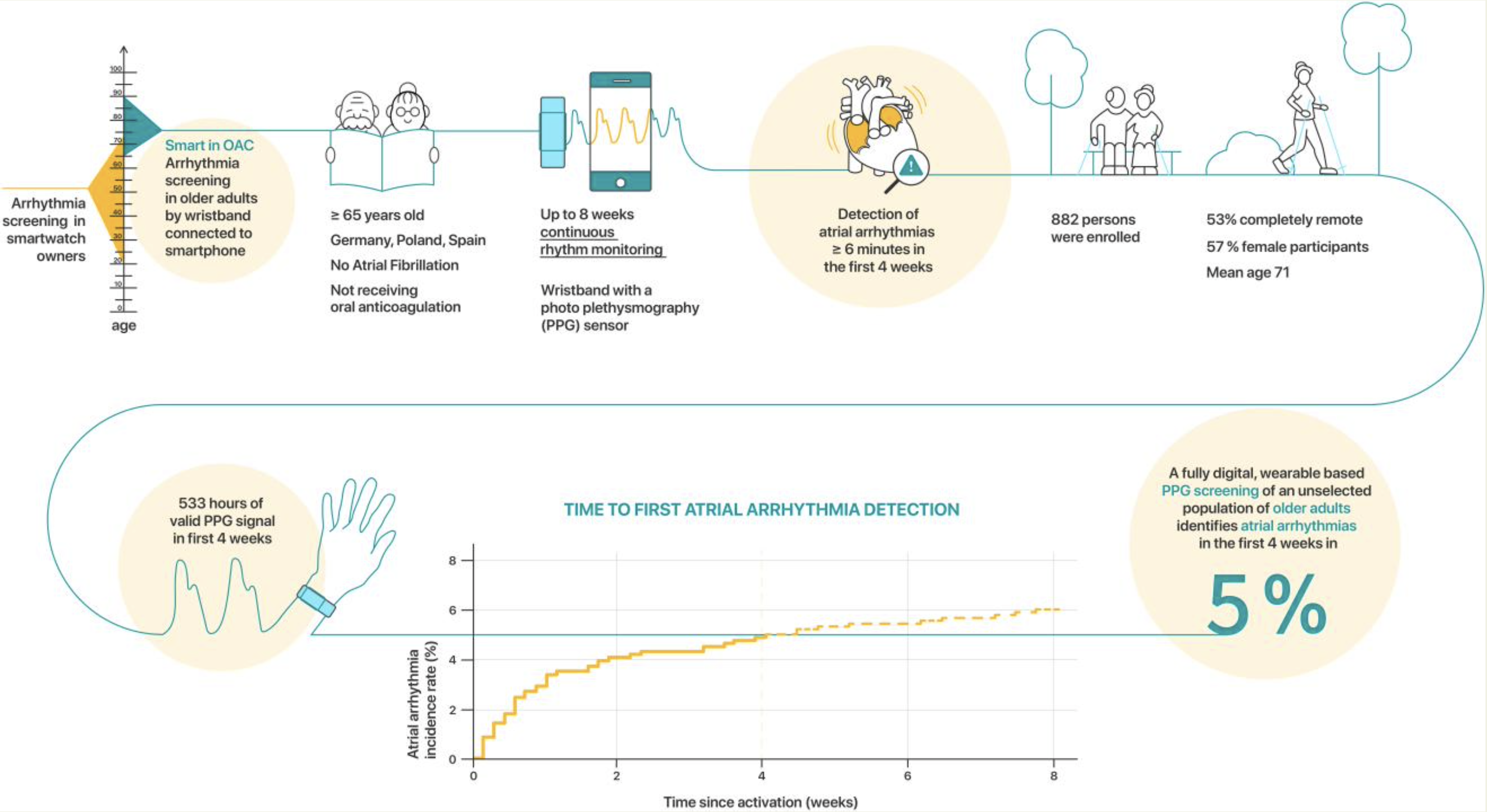Smartphone and wearable detected atrial arrhythmias in Older Adults: Results of a fully digital European Case finding study

The fully remote, investigator-initiated Smartphone and Corsano Health’s CardioWatch 287 wearable detected atrial arrhythmia in Older Adults Case finding study (Smart in OAC—AFNET 9) digitally enrolled participants ≥65 years without known atrial fibrillation, not receiving oral anticoagulation in Germany, Poland, and Spain for 8 weeks. Participants were invited by media communications and direct contacts. Study procedures adhered to European data protection. Consenting participants received a wristband with a photoplethysmography sensor to be coupled to their smartphone. The primary outcome was the detection of atrial arrhythmias lasting 6 min or longer in the first 4 weeks of monitoring.
Conclusion: Remote, digitally supported consumer-electronics-based screening is feasible in older European adults and identifies atrial arrhythmias in 5% of participants within 4 weeks of monitoring.
L Fabritz 1,2,3,4,5 *, DL Connolly 4,6, E Czarnecki 5, D Dudek 7,8, E Guasch 9,10,11, D Haase 5, T Huebner 12, A Zlahoda-Huzior 13, K Jolly 14, P Kirchhof 2,3,4,5, J Obergassel 1,2,3, U Schotten 5,15, E Vettorazzi 16, SJ Winkelmann 1,2, A Zapf 16, and RB Schnabel 2,3,5
- University Center of Cardiovascular Science, University Heart and Vascular Center Hamburg, University Medical Center Hamburg-Eppendorf, Martinistr. 52, 20251 Hamburg, Germany
- Department of Cardiology, University Heart and Vascular Center Hamburg, Martinistr. 52, 20251 Hamburg, Germany
- DZHK German Center for Cardiovascular Research,
partner site Hamburg/Luebeck/Kiel, Germany - Institute of Cardiovascular Sciences, University of Birmingham, Edgbaston Wolfson Drive, B15 2TT Birmingham, UK
- Atrial Fibrillation NETwork (AFNET), Mendelstr 11, 48149 Münster, Germany
- Department of Cardiology and R&D, Birmingham City Hospital, Sandwell and West Birmingham Trust, Dudley Road, B18 7QH Birmingham, UK
- Jagiellonian University Medical College, Center for Digital Medicine and Robotics, Ul. Kopernika 7E, 33-332 Kraków, Poland
- Maria Cecilia Hospital, Via Corriera, 1, 48033 Cotignola RA, Italy
- Institut Clínic Cardio-Vascular, Hospital Clínic, University of Barcelona, Carrer de Villaroel, 170, 08036 Barcelona, CA, Spain, Spain
- IDIBAPS, Rosselló 149-153, 08036 Barcelona, CA, Spain
- CIBERCV, Monforte de Lemos 3-5, Pabellon 11, Planta 0, 28029 Madrid, Spain
- Preventicus GmbH, Ernst-Abbe-Straße 15, 07743
Jena, Germany - Department of Measurement and Electronics, AGH University of Science and Technology, Al. Mickiewicza 30, 30-059 Kraków, Poland
- Institute of Applied Health Research, University of Birmingham, Edgbaston, B15 2TT Birmingham, UK
- Department of Physiology, Cardiovascular Research Institute Maastricht, Maastricht University Medical
Center +, Debyelaan 25, 6229 HX, Maastricht, The Netherlands - Institute of Medical Biometry and Epidemiology, University Medical Center Hamburg-Eppendorf, ChristophProbst-Weg 1, 20246 Hamburg, Germany
European Heart Journal - Digital Health, Volume 3, Issue 4, December 2022, Pages 610-625, https://doi.org/10.1093/ehjdh/ztac067
